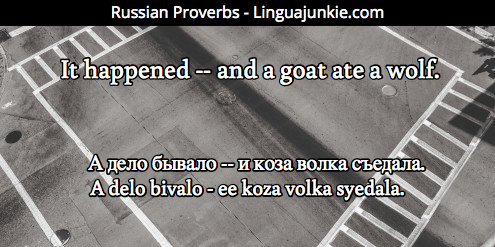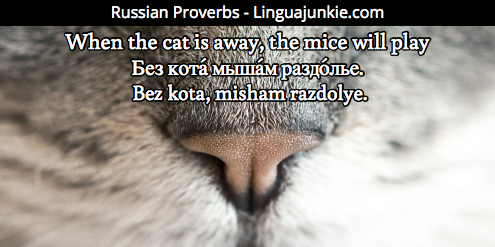What’s Russian learning without some proverbs and sayings? Knowing these will help you can speak more and express yourself better in Russian.
Russian is filled with a TON of them so feel free to browse through the many parts I post.
In part 3, you learn the next set of Russian proverbs with English translations and explanations. You’ll know how to say hem with the Russian Pronunciation part. Ready? Cool.
✅ Hey, if you REALLY want to learn & speak Russian, I suggest RussianPod101. You get 1,000+ audio/video courses, lessons by Russian teachers and a whole learning system. Sign up at RussianPod101 (click here) and start learning! I recommend ’em as a teacher & learner.
31. “When Pigs Fly” in Russian
- А дело бывало — и коза волка съедала.
- English pronunciation: A delo bivalo – ee koza volka syedala
- Literal Meaning: It happened — and a goat ate a wolf.
However, pigs tend not to fly in Russian culture. But there are plenty of stories about wolves. In this case, “when pigs fly” becomes “and a goat ate a wolf,” because how likely is it for a goat to eat a wolf?
Key Vocab:
- коза – goat
- волк – wolf
- бывало – (it) happened

32. “Draw not your bow till your arrow is fixed.”
- Аво́сь да как-нибу́дь до добра́ не доведу́т.
- English pronunciation: Avos’ kak nibud do dobra ne dovedoot.
- Literal Meaning: Maybe and somehow won’t make any good.
The literal meaning says it best – Maybe and somehow won’t make any good. Hoping on something to somehow, maybe work it isn’t good practice. Actively trying to make it work – or fixing the arrow before you fire it – does.
Key Vocab:
- Аво́сь – maybe
- как-нибу́дь – somehow

33. You have to learn to walk before you can run
- Азбука — к мудрости ступенька.
- English pronunciation: Azbuka, k mudrosti stupenka.
- Literal Meaning: The Alphabet is the step to wisdom.
This is a very popular Russian proverb and may as well be used world-wide. The alphabet is needed one step to wisdom. Then you learn words. Then sentences. Then, you begin exploring ideas.
Key Vocab:
- Азбука – the alphabet
- мудрость – wisdom
- ступенька – step

34. Petty thieves are hanged, but great ones are praised.
- Алты́нного во́ра ве́шают, а полти́нного че́ствуют.
- English pronunciation: Altinnovo vora veshayut, a poltinnovo chestvuyut
- Literal Meaning: The thief who stole an altyn (3 coins) is hung, and the one who stole a poltinnik (50 coins) is praised.
Key Vocab:
- во́р – thief
- вешать – to hang
- чествить – to honor

35. Appetite comes at meal time.
- Аппети́т прихо́дит во вре́мя еды́.
- English pronunciation: Appetot prihodit vo vremya yedi.
- Literal Meaning: Appetite comes at meal time.
In other words, there’s a time and place for everything. A time for eating is during the mealtime.
Key Vocab:
- Аппети́т – appetite
- приходить – to come

36. No one can know for sure.
- Ба́бушка гада́ла, на́двое сказа́ла.
- English pronunciation: Babushka gadala, nadvoye skazala.
- Literal Meaning: Grandma was telling fortunes, said two things
Old ladies are quite the gossiping chatterboxes in Russian culture. Hence this proverb. Grandma’s say a lot of things which may or may not be true.
Key Vocab:
- Ба́бушка – Grandmother or old lady
- гадать – to tell fortune/read fortune

37. When the rich make war it’s the poor that die.
- Ба́ры деру́тся — у холо́пов чубы́ треща́т.
- English pronunciation: Bari derutsya – oo holopov chubi treshat’.
- Literal Meaning: Masters are fighting, servants’ forelocks are creaking.
The men that decide on war are rich. They don’t fight. They don’t want to nor have to. But they’ll wage war. Why? They can command the poor, young soldiers.
Key Vocab:
- Ба́р – Refers to the word Баро́н – Baron, is an old title of nobility in Europe. Not a word of Russian origin but of French.
- драться – to fight
- холо́п – slave

38. Trouble never comes alone.
- Беда́ никогда́ не прихо́дит одна́.
- English pronunciation: Beda nikogda ne prihodit odna
- Literal Meaning: Trouble never comes alone.
Basically, another version of “out of the frying pan and into the fire” or “when it rains, it pours.” When there’s one problem, there’s usually another one.
Key Vocab:
- Бедa – trouble
- никогда – never

39. Poverty is in want of much, Greed — of everything.
- Бедному нужно многое, жадному — всё.
- English pronunciation: Bednomu nuzhno mnogoye, zhadnomu – vso.
- Literal Meaning: A poor man is in want of much, a greedy one — of everything.
This is definitely self-explanatory. Poverty requires basic needs to be satisfied. And greed?
- бедный – poor
- жадный – greedy
- нужно – needs/must/necessary

40. When the cat is away, the mice will play
- Без кота́ мыша́м раздо́лье.
- English pronunciation: Bez kota, misham razdolye.
- Literal Meaning: Without a cat, mice feel free.
Just as the English proverb, it’s the same in Russian. When the person who is in charge of a place is not there, and the people there behave badly – or not badly – rather, they will have fun and do things the person in charge doesn’t allow.

What do you think?
What’s your favorite proverb?
Make sure to leave a comment and share this post.
– The Main Junkie


[…] Read part 3 here. […]
[…] Read Part 3 here. […]